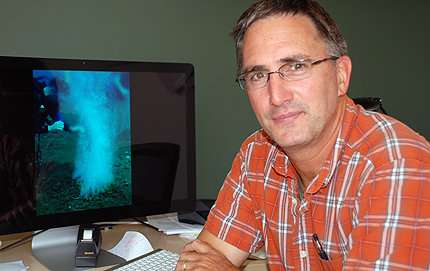Researchers to study life in Earth's subsurface biosphere

A team of researchers led by Jan Amend, professor of earth sciences and biological sciences in USC Dornsife, has been selected to join the prestigious NASA Astrobiology Institute (NAI), an organization of competitively selected teams that integrate astrobiology research and training programs in concert with the national and international science communities.
As part of the institute, the team will receive a five-year grant of approximately $6 million to investigate microorganisms that live in Earth's subsurface biosphere, the habitable area below the planet's surface.
The team will be making inroads into a relatively new area of research, as very little is known about the subsurface biosphere.
"We don't know what organisms are living in the subsurface, how far down the biosphere extends or how active the community is that's down there," Amend said. "At this point our research is very exploratory."
The team's research could become a template for collecting evidence of life or past life on extraterrestrial planetary bodies such as Mars, meeting the mission of NASA's astrobiology program, which seeks to understand how life begins and evolves; if there is life beyond Earth; and, if so, how it can be detected.
The USC Dornsife-led team will target a variety of subsurface environments in their search for microorganisms that encompass different thermal regimes, rock types, water chemistry and flow rates. Locations include predominantly continental sites in mines and boreholes throughout the United States, as well as a marine system in the middle of the Atlantic Ocean called North Pond.
The team will be targeting the subsurface biosphere because on a planet such as Mars, where surface conditions are quite harsh, the subsurface is more likely than the surface to contain evidence of life, Amend explained.
"Basically, we will be practicing looking for subsurface life on Earth before we imagine doing it on Mars or another planetary body," Amend said.
The researchers will also experiment with in situ sampling techniques, which take place at the site. If an expedition is going to Mars or another planetary body, it is very costly to send samples back to Earth for analysis, Amend said.
"If you can send over a rover to do investigations in situ – do analyses there and send back data rather than samples – it's significantly cheaper," he said.
The interdisciplinary research team includes Amend, who will serve as principal investigator; Kenneth Nealson, Wrigley Chair in Environmental Studies and professor of earth sciences and biological sciences in USC Dornsife; Katrina Edwards, professor of earth sciences, biological sciences and environmental studies, and director of the Center for Dark Energy Biosphere Investigations in USC Dornsife; Moh El-Naggar, assistant professor of physics in USC Dornsife; Holly Willis, director of academic programs at USC's Institute for Multimedia Literacy; Victoria Orphan, professor of geobiology at California Institute of Technology; Rohit Bhartia, a scientist at Jet Propulsion Laboratory; Duane Moser, a microbial and molecular ecologist at the Desert Research Institute in Las Vegas; and Yuri Gorby, professor of geomicrobiology at the Rensselaer Polytechnic Institute, formerly of USC Dornsife.
The USC Dornsife-led team is among five research teams selected from 41 candidate teams during this round of funding. Of the five selected, three teams were renewed from previous funding cycles, making the USC Dornsife team one of two new research teams selected to join the NAI this year.
The team will receive additional funding from USC. Their research will complement other investigations taking place at the university conducted through the Center for Dark Energy Biosphere Investigations (C-DEBI), housed in USC Dornsife. C-DEBI, of which Amend is associate director, studies life in the deep subseafloor biosphere.
Provided by University of Southern California